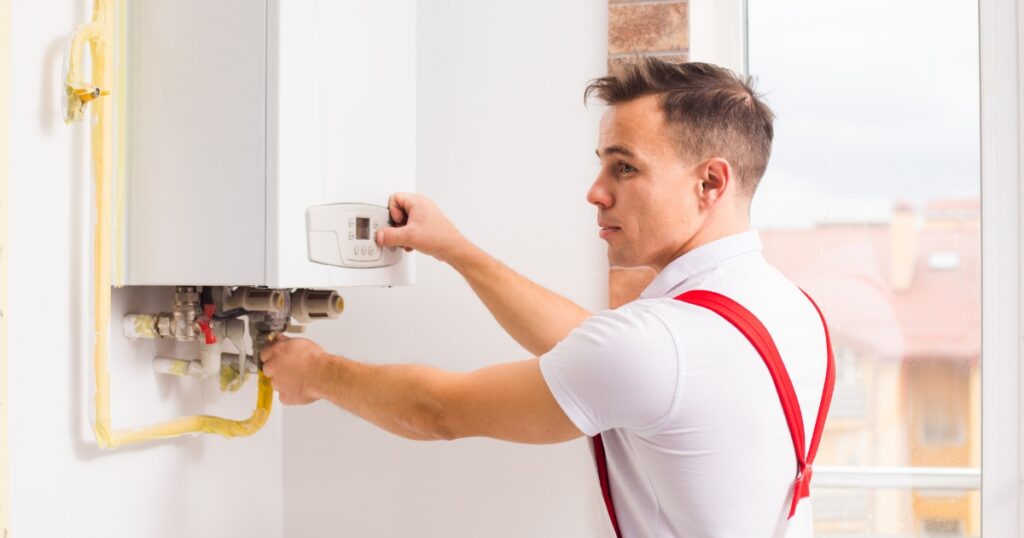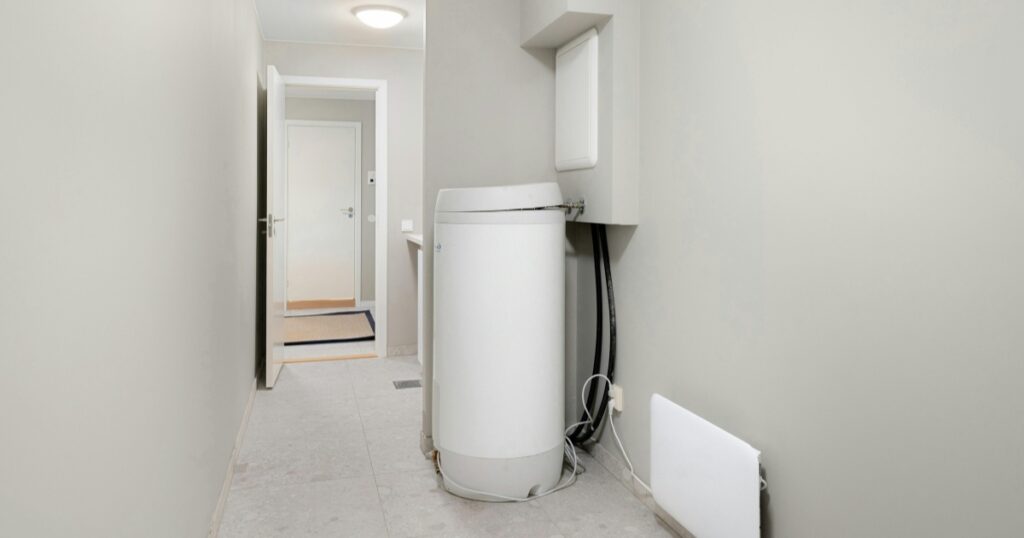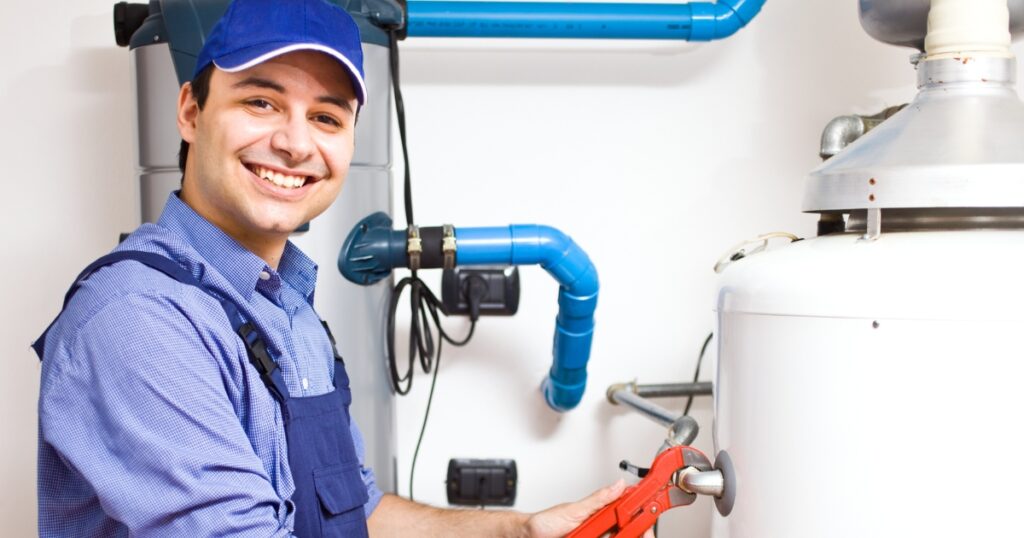Finding out your hot water’s carked is a proper pain in the neck. We’ve had our fair share of cold showers, too, so you’re not alone. After diving deep into heaps of research, we’ve sussed out the best ways to sort this issue out.
Our guide will walk you through spotting when something’s off with your system, figuring out if it’s time for a repair or a total replacement, and even how to upgrade the whole shebang efficiently.
Key Takeaways
- Spotting signs like running out of hot water too quickly, weird temperatures, rusty water, or odd noises can mean your heat exchanger’s got a problem.
- Regular checks and cleaning of your system stop small issues from turning big and help keep your showers warm all year round.
- If fixing costs more than half the price of a new one or if it’s an old system, thinking about replacing it with something more energy-saving might be smarter.
- Installing tankless heaters or going for solar options can cut down on power bills while being kinder to the planet.
- Always getting a skilled technician to check out your system ensures you’re safe from dangers like carbon monoxide leaks and keeps everything running smoothly.
Signs That Your Hot Water Service System Needs Repair
Is your hot water system giving you the cold shoulder lately? Notice insufficient hot water, fluctuating temperatures, discoloured water, or strange noises coming from your hot water service. These signs could indicate that your system needs some attention.
Insufficient hot water
We often hear about homes running out of hot water too quickly, indicating a potential issue with the heat exchanger in the hot water system. This problem can disrupt your daily routine, leaving you with cold showers instead of the warm, comforting ones you expect.

A faulty heat exchanger restricts the system’s ability to properly heat water, leading to a diminished supply.
Addressing this requires inspecting the hot water service for signs of damage or malfunction. Since replacing a cracked heat exchanger is usually necessary due to safety concerns like carbon monoxide risk, we advise contacting professionals for an assessment.
They understand how crucial it is to ensure your family’s safety and comfort by providing quick and efficient solutions, whether that involves repairing minor issues or undertaking more significant replacements.
Fluctuating temperatures
When we notice fluctuating temperatures in our hot water, it may indicate a potential issue with the heat exchanger. Fluctuations in water temperature can be a sign of mineral buildup or sediment accumulation within the system.
These deposits can affect the efficiency of the heat exchanger and lead to inconsistent heating of water. To address this, regular maintenance such as flushing and cleaning the system is crucial to prevent these fluctuations from occurring.
Understanding that fluctuating temperatures may result from underlying issues with the heat exchanger underscores the importance of proactive maintenance. Regular inspections and addressing any sediment buildup are essential for sustaining consistent hot water temperatures and ensuring optimal performance of your hot water system.
Discolored water
If you notice discoloured water coming from your hot water taps, it could be a sign of rust or sediment buildup inside the tank or pipes. This can affect the quality of your hot water and may indicate that your hot water system needs attention.
The presence of discoloured water in your home’s hot water supply may also point to an issue with the heat exchanger, which might require professional inspection and potential repair.
To address this issue, consider scheduling a maintenance check with a qualified technician who can assess the condition of your hot water system and determine if there are any underlying issues contributing to the discolouration.
Catching and resolving these problems early can help prevent further damage to your heat exchanger and ensure that your hot water system continues to function properly.
Moving forward‚ regular inspections and timely repairs will help maintain the efficiency and performance of our hot water systems while ensuring reliable access to clean‚ high-quality hot water for our homes.
Strange noises
If you hear strange noises coming from your hot water system, such as banging, popping, or rumbling sounds, it could indicate sediment buildup inside the tank. Over time, mineral deposits can accumulate at the bottom of the tank and cause these noises.
Regularly flushing out the tank and having it professionally cleaned can help prevent this issue.
In some cases, unusual sounds may also be a sign of a failing heating element or an aging hot water system. It’s important to have a licensed technician inspect your hot water system to determine the source of the noise and address any necessary repairs promptly.

Types of Hot Water System Repairs
When a hot water system malfunctions, it’s crucial to consider the type of repair required. Understanding the specific needs of electric, gas, solar, and heat pump systems can help you make informed decisions about your hot water service.
For more detailed information on each type of repair, continue reading below.
Electric hot water systems
When considering hot water system repairs, electric hot water systems are commonly found in Australian households. The cost of repairing or replacing an electric hot water system depends on factors such as the age and condition of the unit.
It’s important to note that regular maintenance can help extend the lifespan of these systems, potentially reducing repair costs. In some cases, if a repair is not viable due to the age or extent of damage, homeowners may need to consider upgrading to a more energy-efficient option for long-term savings.
Gas hot water systems
Gas hot water systems are a popular choice for many homeowners due to their efficiency and cost-effectiveness. Regular maintenance, such as inspecting for gas leaks, ensuring proper ventilation, and checking the pilot light, is crucial for safe operation.
If you notice issues like insufficient hot water or unusual noises coming from your gas hot water system, it’s advisable to seek professional servicing immediately. When considering repairs or replacement of a faulty heat exchanger in a gas hot water system, it’s important to consult with an experienced technician who can provide accurate cost estimates and advise on the best course of action.
Understanding that regular maintenance is essential for optimal performance is key when dealing with gas hot water systems. Seeking expert advice could potentially save both time and money in addressing any problems that may arise.
Solar hot water systems
When considering energy-efficient upgrades for your hot water system, solar hot water systems are a sustainable and cost-effective option. Harnessing the power of the sun, these systems use solar panels to heat water for your household needs.
Solar hot water systems are an eco-friendly choice that can significantly reduce your electricity bills while providing reliable hot water. The initial investment in installing a solar hot water system may be higher than traditional systems; however, over time, you will benefit from lower operating costs and reduced environmental impact.
With proper maintenance and regular inspections, solar hot water systems can provide efficient and long-lasting performance, making them a worthwhile investment for environmentally conscious homeowners.
Heat pump hot water systems
Heat pump hot water systems operate by extracting heat from the air and transferring it to the water in the tank. This energy-efficient method can significantly reduce electricity consumption, making it a cost-effective solution for heating water.
With regular maintenance and timely repairs, these systems can provide efficient hot water for many years. However, when issues arise, professional technicians can diagnose and address problems such as compressor or refrigerant leaks to ensure optimal performance.
Regular servicing and inspections are essential for maintaining heat pump hot water systems. Ensuring that the refrigerant levels are adequate and that all components are functioning properly can prevent costly repairs down the line.
Hot Water System Maintenance Tips
Regular inspections ensure the smooth functioning of your hot water system. Draining the tank helps remove sediment buildup and maintain efficiency.
Regular inspections
Inspecting your hot water system regularly is crucial to ensure it’s functioning optimally. Regular inspections help identify potential issues early, preventing costly repairs down the line.
An annual inspection by a professional technician can help detect any wear and tear on components such as the heat exchanger, ensuring your hot water system continues to operate efficiently.
Scheduling regular inspections for your hot water system not only extends its lifespan but also enhances its energy efficiency, saving you money in the long run. When overlooked, small problems can quickly escalate into major issues that require extensive repairs or even replacement of the entire system.
This proactive approach to maintenance ensures that your hot water service runs smoothly and provides consistent comfort for your home.
Upkeep of this kind will add years of life to your hot water service while minimising unexpected breakdowns when you least expect them.
Draining the tank
When draining the hot water tank, turn off the power or gas supply to the system. Use a garden hose to connect to the drain valve at the bottom of the tank and direct it outside or into a floor drain.
Wait for the water to cool down before emptying it to avoid scalding injuries. Once drained, flush out any sediments by letting cold water run into the tank until it runs clear from the hose.
After draining and flushing, be sure to turn on the power or gas supply and allow time for the tank to refill and reheat before using hot water again. Regularly draining your hot water tank helps prevent sediment buildup that can reduce efficiency and cause damage, prolonging its lifespan.
Checking for leaks
After draining the tank, it’s crucial to inspect your hot water system for any leaks. Look for signs of moisture around connections, valves, and the base of the tank. Pay attention to any puddles or damp spots on the floor near the unit.
Even small leaks can lead to bigger issues over time, so prompt action is vital.
Regularly checking for leaks can help you catch potential problems early and avoid costly repairs down the track. If you notice any leaks or suspect a problem, it’s best to have a professional plumber assess and rectify the issue promptly.
Choosing Between Repairing or Replacing Your Hot Water System
When deciding between repairing or replacing your hot water system, assessing the extent of the issue and weighing repair costs versus replacement expenses are crucial. To make an informed decision, consider factors like the age of your system and its overall efficiency.
Keep reading to learn more about making this important choice for your home.
Factors to consider
When determining whether to repair or replace a faulty hot water system, there are several key factors to consider. Firstly, the age of your hot water system is crucial. If it’s nearing the end of its expected lifespan and has been prone to frequent issues, replacing it might be more cost-effective in the long run.

Additionally, take into account the cost of repairs versus a new installation; if repairs exceed half the price of a replacement and your system is out of warranty, replacing it may be a better investment.
Moreover, consider your energy efficiency goals; newer models often offer better energy-saving features that can help lower utility bills over time.
When to repair
Repairing your hot water system is a practical choice if the repair cost is less than half of a new system, especially for an older unit that is no longer under warranty. It’s essential to consider factors such as the age of the system and the severity of the issue when making this decision.
Additionally, understanding that some components, like heat exchangers, cannot be repaired due to safety concerns ensures that you can make informed choices about when to repair your hot water system.
When considering repairs, keep in mind that addressing minor issues promptly can prevent costly problems down the line. Regular maintenance and timely repairs help extend the lifespan of your hot water service while keeping costs manageable.
When to replace
If the cost of repairing your hot water system’s heat exchanger exceeds half the price of a new system, it may be more economical to replace it. As heat exchangers cannot be repaired or replaced due to the risk of carbon monoxide leaking into the home, replacement is often the only viable option.
Additionally, issues such as a cracked heat exchanger will likely necessitate replacement, which can incur significant costs. It is important to consider these factors when determining whether it’s time for a replacement.
Understanding how long your hot water system has been in use and whether it’s past its warranty period is also crucial in deciding when to replace it. For continuous flow systems, the manufacturer’s warranty period for the heat exchanger typically ranges from 10-12 years.
Energy-Efficient Upgrades to Consider
When considering energy-efficient upgrades for your hot water system, tankless heaters offer a convenient and eco-friendly solution. In addition, emergency hot water system repairs can provide peace of mind while ensuring optimal performance and longevity.
Tankless heaters
Tankless heaters, also known as on-demand water heaters, are a popular energy-efficient upgrade to consider for hot water systems. These units only heat water when it is needed, which can lead to significant savings on energy bills.
Additionally, tankless heaters are compact and can be installed in smaller spaces compared to traditional hot water tanks. For homeowners looking to reduce their environmental impact, tankless heaters provide an eco-friendly option by reducing standby heat loss associated with conventional storage tank water heaters.
It’s important to note that the initial installation cost of a tankless heater may be higher than traditional systems, but the long-term energy savings could outweigh the upfront investment.
– Tankless heaters offer an endless supply of hot water since they do not rely on a stored reservoir of heated water like traditional systems. This feature makes them ideal for households with high hot water demand or those seeking consistent and continuous access to hot water without worrying about running out during peak usage times.
Emergency hot water system repairs
If your hot water system suddenly fails, contact a licensed professional for emergency repairs. Water leaks, strange noises, or a complete lack of hot water could indicate an urgent issue that needs immediate attention.
Check for any warning lights on the unit and follow the manufacturer’s instructions for troubleshooting to determine whether you need to call for emergency repairs.
In case of a heat exchanger failure, it’s essential to act swiftly as this can lead to carbon monoxide leakage. Timely repair or replacement can prevent hazardous situations and maintain the safety of your home.
Swift Hot Water Solutions Tailored to Your Space!
When considering repairing or replacing a faulty hot water service heat exchanger, cost and warranty are crucial factors. Professional technicians can assess whether the heat exchanger can be repaired or must be replaced due to safety concerns.
Understanding these options is essential for maintaining a safe and efficient hot water system at home.
Is your hot water service experiencing issues with its heat exchanger? Don’t let a faulty heat exchanger disrupt your comfort and convenience. At Hot Water Repairs Today, we specialize in repairing and replacing heat exchangers to ensure your hot water system operates efficiently.
Our team of skilled technicians will diagnose the problem with your heat exchanger and provide tailored solutions to restore optimal functionality. Whether it requires repair or replacement, we’ll handle the job with precision and expertise.
Don’t let a faulty heat exchanger compromise your hot water supply. Contact Hot Water Repairs Today for prompt and reliable service to get your hot water system back up and running smoothly!






